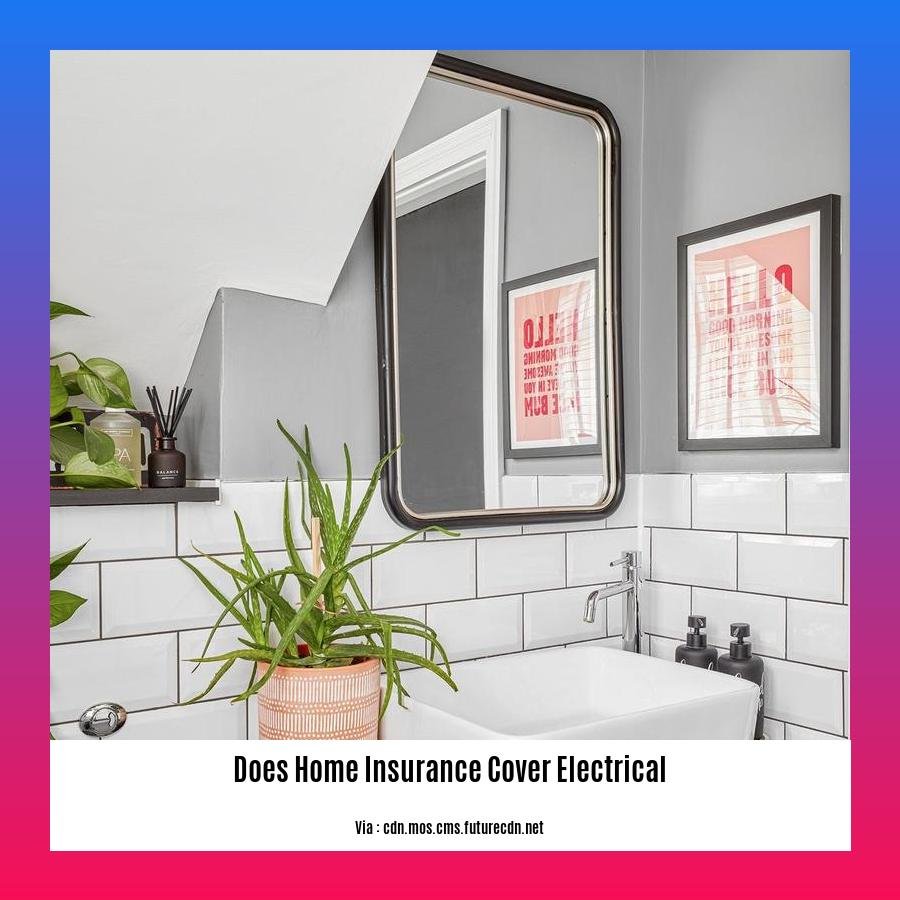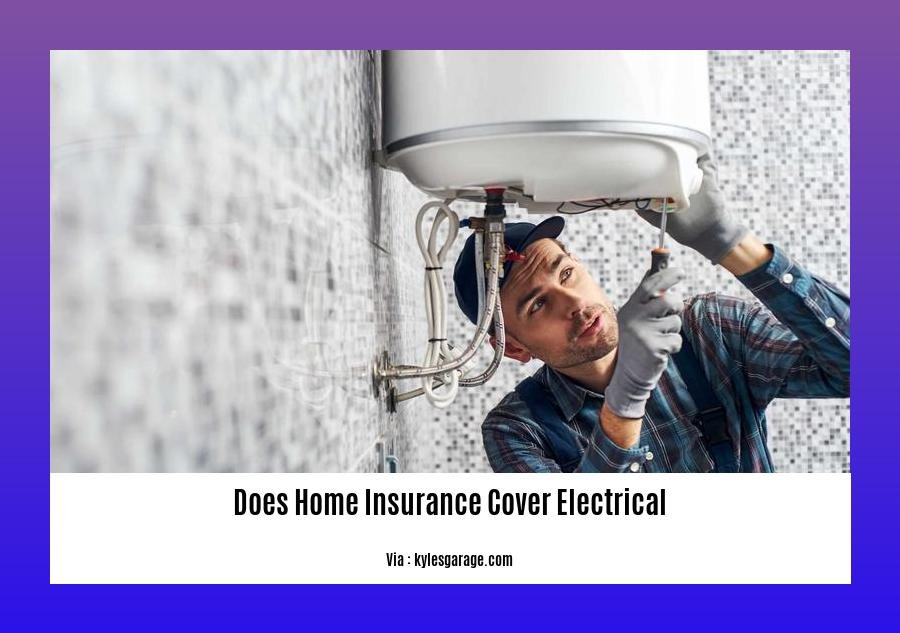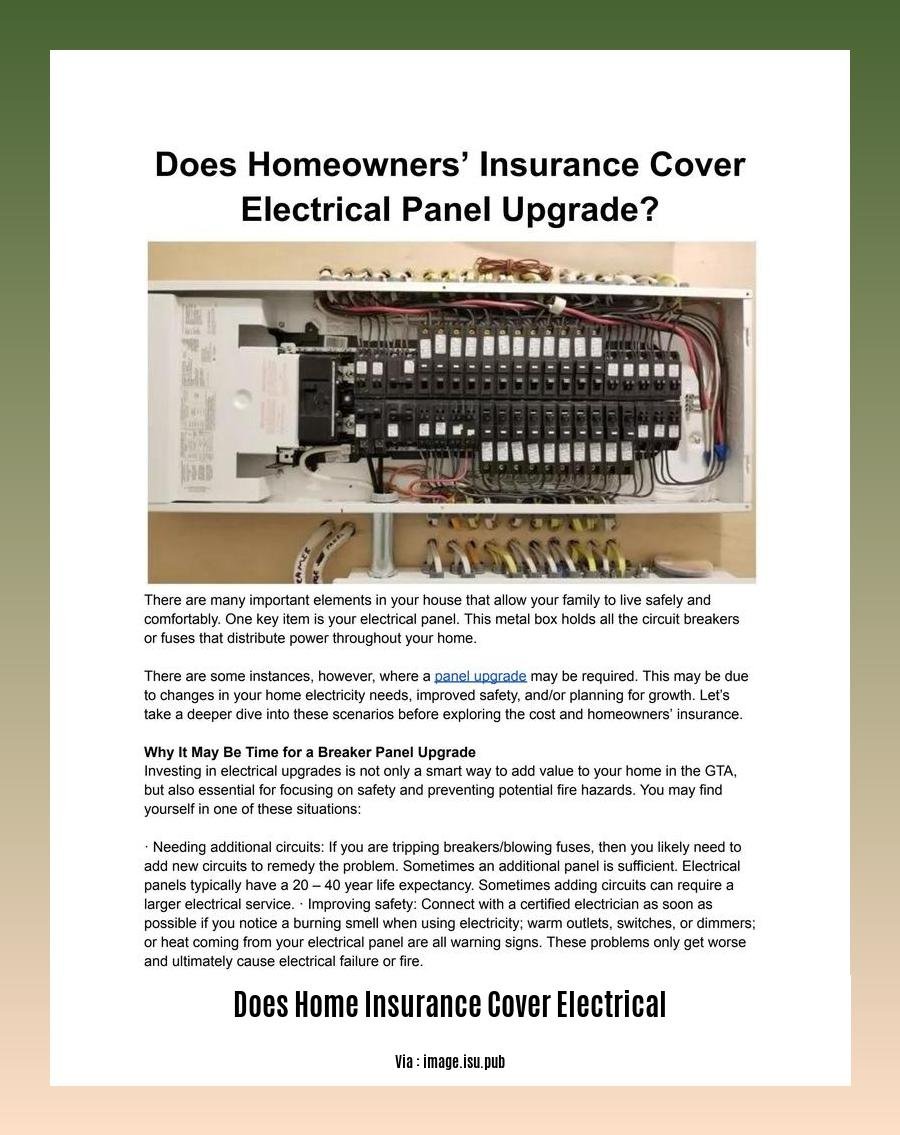[- Does Home Insurance Cover Electrical Issues: An Insurance Expert’s Guide] – When dealing with electrical problems in your home, understanding whether your home insurance policy offers coverage is crucial. This comprehensive guide delves into the intricacies of homeowners insurance coverage for electrical issues, providing insights into the extent of coverage, types of electrical problems covered, and the claims process involved. Whether you’re dealing with faulty wiring, power surges, or appliance malfunctions, this expert guide will help you navigate the complexities of home insurance and ensure you receive fair and timely compensation for electrical damage.
Key Takeaways:
-
Home insurance typically covers electrical problems in most residential properties.
-
Some insurance policies may exclude coverage for outdated wiring systems, such as knob-and-tube or aluminum wiring.
-
Older homes built before the 1960s are more susceptible to electrical issues due to aging wiring.
-
The extent of coverage for electrical problems is influenced by the cause of the issue and the condition of the electrical system.
Does Home Insurance Cover Electrical Issues?

From lightning strikes to faulty wiring, homes can face various electrical hazards. Navigating insurance policies to determine coverage for electrical issues can be daunting. This guide will shed light on what homeowners insurance typically covers regarding electrical problems.
Electrical Coverage in Home Insurance:
Most standard homeowners insurance policies provide coverage for electrical problems that result from sudden and accidental events, such as:
However, it’s important to remember that not all electrical issues are covered. Exclusions may include:
Assessing Coverage Limits for Electrical Issues:
The coverage limits for electrical issues vary among insurance policies and providers. It’s crucial to review your policy to understand the coverage amount available for electrical repairs or replacements. Common coverage limits include:
Filing a Claim for Electrical Damage:
If you experience electrical damage covered by your homeowners insurance, follow these steps to file a claim:
1. Document the Damage: Take photos and videos of the damaged area, including the electrical components and any resulting damage.
2. Contact Your Insurance Company: Reach out to your insurance provider as soon as possible to report the claim.
3. Provide Necessary Information: Be prepared to share details about the incident, including the date and cause of the damage.
4. Cooperate with the Claims Process: Your insurance company may send an adjuster to inspect the damage and assess the cost of repairs.
5. Document Repair Costs: Keep receipts for any repairs or replacements made due to the electrical damage.
If your claim is denied or you disagree with the settlement offered, you can appeal the decision by following the process outlined in your insurance policy.
Remember: Home insurance policies vary in their coverage for electrical issues. It is essential to review your policy thoroughly, understand the coverage limits, and discuss any specific concerns with your insurance agent.
-
If you’re experiencing electrical issues in your home, find out if home insurance covers electrical issues.
-
Curious about whether home insurance covers garage door damage? We’ve got the answers.
-
Get the facts straight: does home insurance cover leaking windows? We’ve got the lowdown.
-
Are you wondering if home insurance covers pest control? We’ve got the scoop.
Types of Electrical Issues Covered by Homeowners Insurance

When it comes to electrical issues, homeowners insurance can be a lifesaver, providing coverage for a range of problems that can arise in your home’s electrical system. But what exactly does homeowners insurance cover when it comes to electrical issues? Let’s delve into the details:
1. Sudden and Accidental Electrical Damage:
Homeowners insurance typically covers sudden and accidental electrical damage that occurs to your home’s electrical system. This includes damage caused by power surges, lightning strikes, and electrical fires.
2. Electrical Wiring and Appliances:
Your homeowners insurance policy may also cover damage to electrical wiring and appliances inside your home. This includes damage caused by faulty wiring, short circuits, and defective appliances.
3. Electrical Repairs and Replacements:
If electrical damage occurs to your home, your homeowners insurance policy may cover the cost of repairs or replacements. This includes the cost of hiring an electrician to fix damaged wiring, replacing damaged appliances, and restoring your home to its pre-loss condition.
4. Additional Coverage Options:
Some homeowners insurance policies may offer additional coverage options for electrical issues, such as coverage for damage caused by power outages or coverage for the cost of upgrading your home’s electrical system. Be sure to talk to your insurance agent about these additional coverage options to see if they’re right for you.
Key Takeaways:
- Homeowners insurance typically covers sudden and accidental electrical damage to your home’s electrical system.
- Coverage may include damage caused by power surges, lightning strikes, electrical fires, faulty wiring, and defective appliances.
- Your policy may also cover the cost of electrical repairs and replacements, such as hiring an electrician and replacing damaged appliances.
- Additional coverage options may be available, such as coverage for damage caused by power outages or coverage for the cost of upgrading your home’s electrical system.
Citation:
1. Does Homeowners Insurance Cover Electrical Problems?
2. What Does Homeowners Insurance Cover?
Home Electrical Safety Inspection
As a homeowner, ensuring the safety and proper functioning of your home’s electrical system is paramount. This not only reduces the risk of electrical hazards but also ensures your home insurance policy provides adequate coverage. A comprehensive electrical safety inspection helps identify potential issues and ensures your home’s electrical system is up to code.
Key Takeaways:
- Homeowners insurance generally covers electrical problems resulting from sudden and accidental events, such as power surges, lightning strikes, and electrical fires.
- Some electrical issues, including flickering lights, hot outlets, and frayed wiring, may be covered if caused by covered perils.
- Outdated electrical systems, such as knob-and-tube or aluminum wiring, might not be covered by standard home insurance policies.
- Upgrading your home’s electrical system or replacing outdated wiring can reduce fire risks and increase the chances of coverage under your home insurance policy.
Does Home Insurance Cover Electrical Issues?
The extent of coverage for electrical issues under home insurance policies can vary based on the cause of the problem, the age and condition of the electrical system, and the specific policy provisions. Generally, sudden and accidental electrical damage caused by covered perils is typically covered.
Common Electrical Issues Covered by Home Insurance:
-
Power Surges: Damage caused by sudden increases in voltage, often caused by lightning strikes or power grid failures.
-
Electrical Fires: Damage resulting from fires caused by electrical malfunctions or faulty wiring.
-
Faulty Wiring: Coverage for repairs or replacements of faulty wiring that leads to electrical issues or poses safety hazards.
-
Defective Appliances: Damage caused by electrical defects in appliances that result in fires or other property damage.
Electrical Issues Not Typically Covered by Home Insurance:
-
Wear and Tear: Gradual deterioration or aging of electrical components or systems typically isn’t covered.
-
Negligence: Damage caused by negligence or improper maintenance of the electrical system may be excluded.
-
Unpermitted Work: Electrical work performed without proper permits or by unlicensed electricians might not be covered.
-
Intentional Acts: Damage resulting from intentional acts, vandalism, or arson is generally excluded.
Tips for Electrical Safety:
-
Regular Inspections: Schedule regular electrical safety inspections by a qualified electrician to identify and address potential hazards.
-
Upgrade Electrical Systems: Consider upgrading older electrical systems, such as knob-and-tube or aluminum wiring, to reduce fire risks and improve coverage.
-
Use Surge Protectors: Utilize surge protectors to safeguard electronic devices from power surges and voltage spikes.
-
Proper Maintenance: Ensure proper maintenance of electrical appliances and fixtures to prevent malfunctions and fires.
-
Observe Safety Precautions: Adhere to safety guidelines when handling electrical appliances and avoid overloading circuits.
By diligently following electrical safety practices and maintaining a well-maintained electrical system, you can minimize the risk of electrical issues and ensure adequate coverage under your home insurance policy. If you have specific questions or concerns regarding your home’s electrical system, it’s always advisable to consult with a qualified electrician or your insurance provider.
Sources:
Does Homeowners Insurance Cover Electrical Problems?
Electrical Home Inspection Basics: What Should Sellers Expect?
FAQ
Q1: Does homeowners insurance cover electrical problems caused by faulty wiring?
A1: Coverage for electrical problems caused by faulty wiring depends on the specific circumstances and the cause of the damage. If the faulty wiring was a pre-existing condition, it may not be covered. However, if the faulty wiring was caused by a sudden and accidental event, such as a power surge or lightning strike, it may be covered.
Q2: What types of electrical issues are covered by homeowners insurance?
A2: Homeowners insurance typically covers electrical issues caused by sudden and accidental events, such as power surges, appliance breakdowns, and faulty wiring. Some specific examples of covered electrical issues include:
- Electrical fires
- Damage to appliances or electronics caused by power surges
- Repair or replacement of faulty wiring or outlets
- Damage caused by lightning strikes
Q3: How can I file a home insurance claim for electrical problems?
A3: To file a home insurance claim for electrical problems, you should:
- Contact your insurance company as soon as possible after the damage occurs.
- Provide the insurance company with a detailed description of the damage, including the date and time of the incident, the cause of the damage, and the extent of the damage.
- Provide the insurance company with any relevant documentation, such as photos of the damage, receipts for repairs, and estimates from contractors.
- Cooperate with the insurance company’s investigation of the claim.
Q4: What is a home electrical safety inspection?
A4: A home electrical safety inspection is a professional inspection of the electrical system in your home. The inspection will identify any potential hazards or problems with the electrical system, such as faulty wiring, overloaded circuits, or damaged outlets. Electrical safety inspections are typically conducted by qualified electricians.
Q5: Why is it important to have a home electrical safety inspection?
A5: Having a home electrical safety inspection is important because it can help to prevent electrical fires and other electrical hazards. Electrical fires are a leading cause of home fires, and they can cause extensive damage and even loss of life. A home electrical safety inspection can help to identify any potential problems with the electrical system before they cause a fire or other hazard.
- Burning Plastic Smell in House: Causes, Solutions, and Safety Measures - April 8, 2025
- Best Bug Killer for Yard: Effective Pest Control Guide (2024) - April 8, 2025
- Brown Recluse Spider Bites: Identification, Treatment, and Prevention - April 8, 2025










